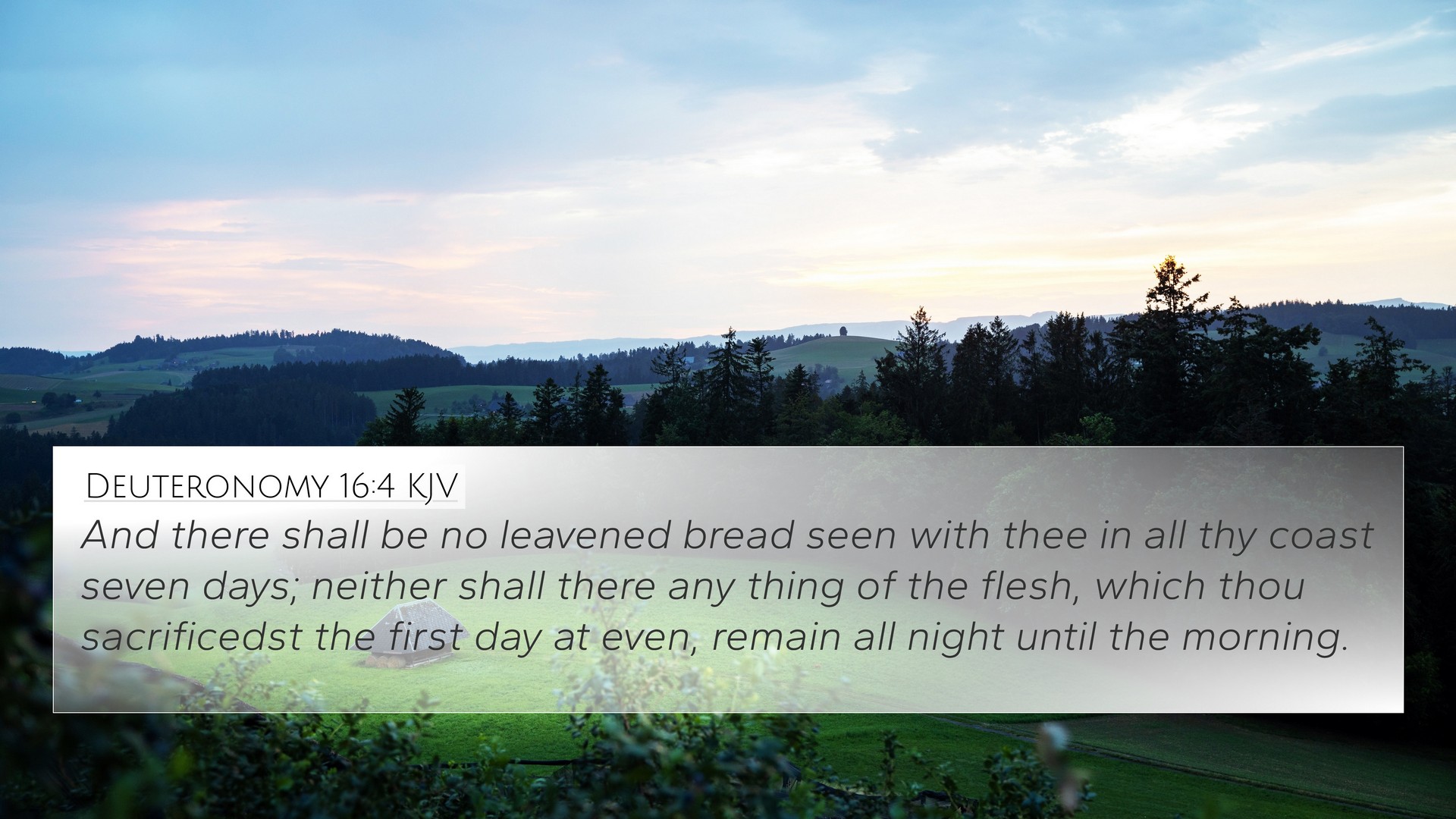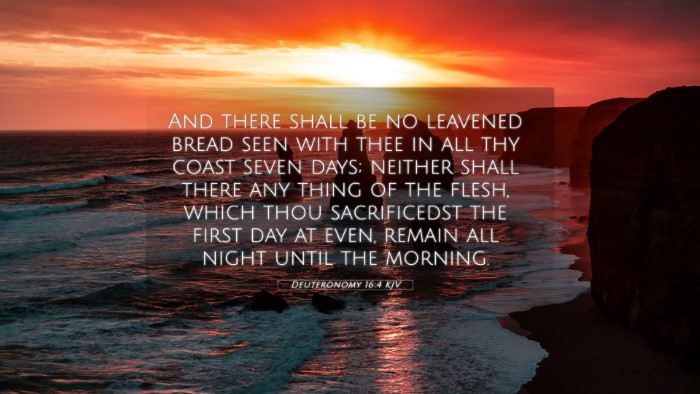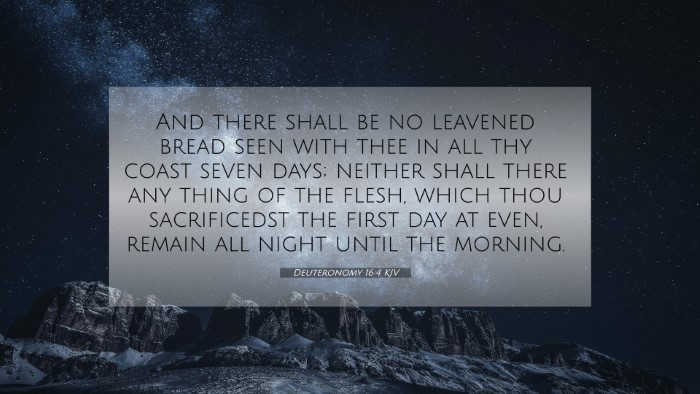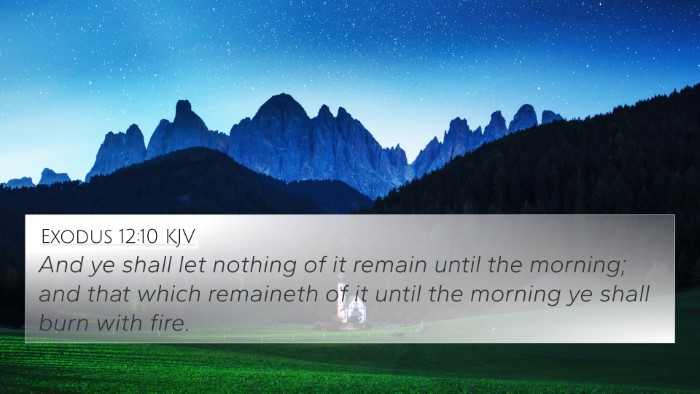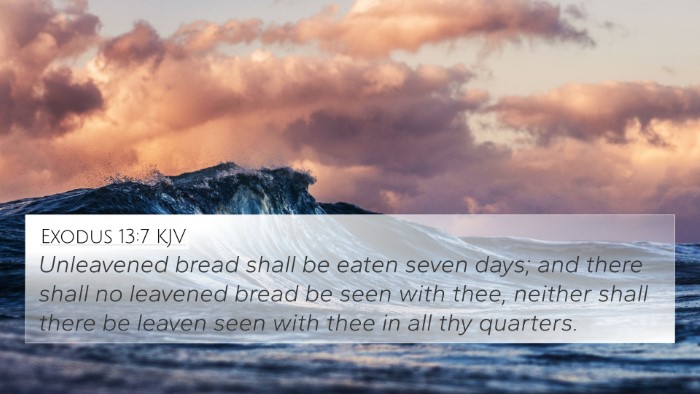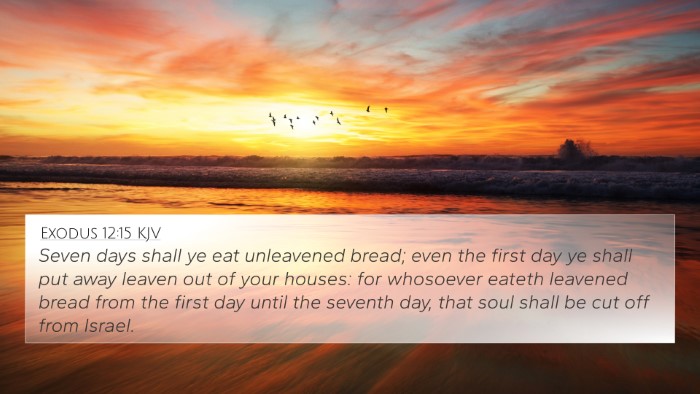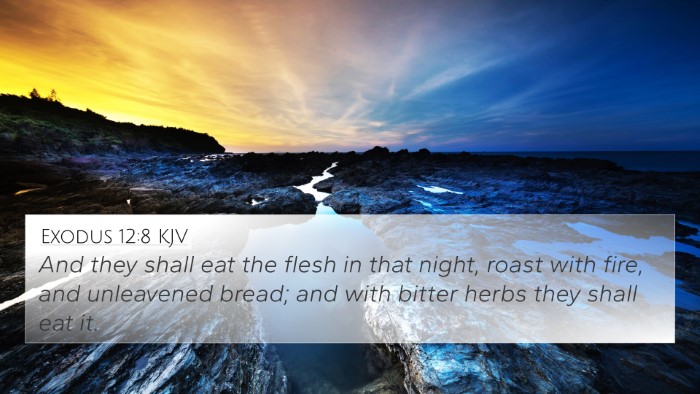Understanding Deuteronomy 16:4
Deuteronomy 16:4 states, "And there shall be no leavened bread seen with thee in all thy coasts seven days; neither shall there anything of the flesh, which thou sacrificed the first day at even, remain all night until the morning." This verse is part of the instructions given to the Israelites regarding the observance of the Passover, emphasizing the importance of purity and dedication in their worship.
Interpretation and Summarization
The focus of this verse lies in the requirement to avoid leaven, which is often symbolically associated with sin and corruption in biblical texts. The command to eliminate leaven during the week of Passover indicates a purification process that reflects spiritual cleanliness. The verse also reinforces God's mandate for the Israelites to observe their feasts responsibly, ensuring that all aspects of their religious observance are done correctly.
Key Themes in Deuteronomy 16:4:
- Purity in Worship: The removal of leaven symbolizes the necessity of holiness in the approach to God.
- Obedience to Divine Command: Compliance with God's laws regarding sacrificial offerings signifies loyalty and reverence.
- Covenantal Relationship: The instructions guide the people to remember their identity as God's chosen people.
Bible Verse Cross-References
To deepen the understanding of Deuteronomy 16:4, we can look at several related verses:
- Exodus 12:15: "Seven days shall ye eat unleavened bread; even the first day ye shall put away leaven out of your houses." This verse clarifies the prohibition against leaven and emphasizes its significance.
- 1 Corinthians 5:6-8: Paul admonishes the church to purge out the old leaven, symbolizing the need for moral integrity within the community.
- Leviticus 23:6: Discusses the feast of Unleavened Bread signifying the timeframe within which leaven should be absent.
- Matthew 16:6: Jesus warns of the leaven of the Pharisees and Sadducees, illustrating the dangers of false teachings.
- Galatians 5:9: "A little leaven leaveneth the whole lump," referring to how sin can influence the whole community.
- John 6:35: Jesus identifies Himself as the bread of life, contrasting with the leaven of sin, emphasizing spiritual sustenance.
- Romans 12:1: The call to present our bodies as a living sacrifice ties to sacrifice principles reflected in the Passover observance.
Discussion on Thematic Connections
Deuteronomy 16:4 finds parallels across various books in the Bible, highlighting the interconnectivity of scriptural themes:
- Sacrifice and Dedication: The directive to not allow leftovers symbolizes total dedication to God, seen similarly in the New Testament calls for complete devotion (Matthew 22:37).
- Consecration: The theme of setting apart what is holy persists from the law in Exodus through the teachings of Jesus and the Apostles.
- Remembrance: Throughout Scripture, the act of remembering God's deliverance from Egypt serves to encourage continued faithfulness (Deuteronomy 5:15; Psalm 77:11-12).
Cross-Referencing Biblical Texts
Understanding Deuteronomy 16:4 benefits from cross-referencing other biblical texts. Tools for Bible cross-referencing enable readers to identify connections across both the Old and New Testaments.
Tools for Bible Cross-Referencing
- Bible Concordance: A useful tool for finding where specific words appear throughout the Bible.
- Cross Reference Bible Study: A methodical approach to analyzing linked scriptures for theological insights.
- Bible Reference Resources: Materials that provide centralized information regarding themes and key concepts.
Identifying Connections Between Old and New Testament
The connections between Deuteronomy 16:4 and New Testament teachings about purity and sacrifice reveal the continuity of God's message. For example, the sacrifice of Christ represents the culmination of the Passover lamb typology, where His blood signifies a new covenant.
Long-Tail Keyword Insights
Understanding the thematic connections allows for discoveries such as:
- How to find cross-references in the Bible: Engaging in comparative studies enhances comprehension of scripture.
- Cross-referencing Psalms with New Testament teachings: Offers insights into worship practices and themes of redemption.
Conclusion
Deuteronomy 16:4 invites readers to reflect on the significance of obeying God's commands, the importance of purity, and the connections existing throughout the Bible. As we examine parallels and themes within scripture, we deepen our understanding of God's word and His covenant with His people, helping us to live a life that's devoted to Him.
